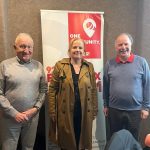To help you make an informed choice at the polling station on November 29th, 92.5 Phoenix FM will be speaking to many of the candidates from Dublin West to hear what their priorities are for the next Dáil. This series is adapted from our ‘General Election 2024’ podcast series as broadcasted on D15 Today, where you will find full-length interviews with the candidates.
Natalie Treacy is a former Sinn Féin councillor for Castleknock. For the last local elections, she was moved to the Cabra-Glasnevin constituency – that of the party’s leader Mary Lou McDonald – so that the party could run four candidates there. This was a move that resulted in not only Treacy not being re-elected as a councillor in her new constituency but Sinn Féin losing its councillor seat in Castleknock. Treacy now makes her first bid for the general election as an independent.
We have highlighted some of the main points raised in the interview.
On running as an independent
Treacy may have lost in the Cabra-Glasnevin constituency, but it is hard to imagine she would faced the same result had she stayed in Castleknock: “As you know, I was elected first in 2014 as the first ever Sinn Féin councillor to the Castleknock ward, and then I was elected again in 2019 when Sinn Féin actually got a bit of a battering across the country. I retained that seat.”
She says that at least to begin with, she was “happy enough” to move to the party leader’s constituency. “People are actually saying to me like it was such a stupid move to move me at the end of my 10-year term into down to the Navan Road area. […] It would have been the next constituency to mine. A lot of that area is in Dublin West, as you know. So it wasn’t that it was outside my jurisdiction. I would have done a lot of work for people down there anyway.”
Treacy ultimately contends however that “in hindsight, it was a mistake”: “It was a mistake because [Sinn Féin] lost the Castleknock seat, and people told me very clearly that since I’ve been moved, that there’s no representation there on the ground […] where I worked really, really hard over the last 10 years to build that kind of rapport and to walk with really hard working committees and local structures there. They just felt that since I was gone, that there was a hole there.”
Treacy says that she did put her name forward for the Sinn Féin contest but “that wasn’t an option. The local structures had made a decision that they didn’t want me as the second candidate there.” After speaking with her former constituents and family and friends, “they had made it very, very clear that they wanted me to stay and represent them. As it turned out, the only option that I had to continue doing the work that I’d done for the last 10 years was to go independent.”
She will be looking for fellow left-of-centre TDs to ally with if elected, and says she will “stand up for the people of Dublin West. […] That’s huge for me […] and I’m really looking forward to that. I know the issues inside out.”
On housing
There are more candidates than not in Dublin West who have personal or family experience of the housing crisis, or have even experienced homelessness themselves. Treacy has “a 20-year-old and a 23-year-old who are both doing really good jobs, but I can never see them moving out of my home. […] They can’t even afford to rent somewhere, never mind to buy somewhere.” She says she has worked hard as a councillor “for the last 10 years […] to try and get as much social and affordable housing built” as possible, and calls for a return to “the ’70s and ’80s and ’90s, when we were a much poorer country than what we are now, we were building thousands of social [housing units]”.
Treacy bought her own home through shared ownership, and she believes this is something the government needs to reconsider if home ownership rates are to stop falling drastically. “If you go back [to] when we used to have the 50/50 scheme, or the affordable scheme with Fingal County Council, because that’s actually how I bought my house. We went in and we bought it through shared ownership. We were able to afford to buy half of the house, and then Fingal owned the other half. After a certain amount of time, you could buy the other half, and that’s how we were able to do it.”
The outgoing coalition has stressed that schemes like the Housing Assistance Payment have made renting easier for those on lower incomes, but Treacy says this has only aggravated the housing crisis. “We came up with this supposedly magic cure with HAP […] that would solve the crisis at the time. But what happened with HAP was, the amount that that’s capped at, the landlords come and they charge double that. If somebody was given HAP from Fingal County Council, and then they have to find the rest of the money, that’s pushing people out of the market because people just can’t afford it, and that’s what’s making the housing crisis even worse.”
On local issues
Treacy is running as an independent out of necessity as her former party Sinn Féin did not back her candidacy. However, a recurring sentiment from some voters is that they believe political parties aren’t working in their interests and are turning to independents. When asked what the issues she is hearing while canvassing are, she says she is “very surprised”: “It’s really different for me as an independent on the doors now, because obviously for the last 10 years, when you’re elected and you’re affiliated to a party, obviously you have policies that are affiliated to the party. But when you’re independent, you’re allowed that little bit more freedom […] on the doors to people. And I think people feel that they can speak a bit more freely to you, to be fair.
“It’s kind of like sometimes people will tell you what you want to hear and they want to just get you away from the garden, and we get that. That’s politics. But I find people are being a little bit more open with me now because they’re angry at the government, but they’re also angry at the opposition parties because they feel that there’s no leadership there, there’s no one standing up for them, there’s no one for them to turn to. And they’re saying they’re going to turn to independents this time.”
Treacy also feels that local issues are more important to voters, at least here in Dublin 15, than national issues going into this election. “What they’re telling me is [our communities] are non-existent, they feel that they’ve been left behind. They feel that after five years of having the Minister for Finance and the former Taoiseach in our area, they feel that they were left behind. […] Even though it’s a general election – normally you’d be talking about national stuff on the doors – they’re talking about local issues. […] They’re still talking about local issues because they feel that their communities have been left behind. They need more simple things like more funding. They need more facilities, more stuff to keep their kids off the streets. […] I was expecting to hear bigger issues, but it’s actually local issues. And people are saying that when you go in there, if we elect you and you go in there, we want you to be able to stand up for the people of Dublin West.”
On health
Health is the other big issue for this election, and Treacy says that while canvassing, issues “ like doctors’ appointments are huge. GPs are huge. Services are huge. You know, I’ve been in here a lot of times with Charlie speaking about this because my mother had an acquired brain injury in 2015. So I ran a huge campaign back then on that. And now I’m getting issues, people on the doors who had acquired brain injuries or other stuff, you know, related to that, that are just being left behind. They can’t get the carers, they can’t get carers’ allowance, they don’t fit the criteria. They’re absolutely broken.”
“I can feel their pain because I went through it myself with my young mother, because they’re trying to look after [not just] young kids [but also] after their spouses. There’s no services and there’s no money there is what they’re being told. So services in general are probably the biggest thing that’s coming up on the doors. But when it comes to Connolly Hospital, when you get in there, fantastic. You couldn’t fault them. It’s getting in there [that’s the problem], people are saying they just can’t get appointments, they can’t get true A&E and they can’t get GP appointments.”
On the cost of living
The October budget, as presided over by newly-appointed Minister for Finance and Dublin West TD Jack Chambers, pulled back on the number of cost-of-living measures after a painful number of years for families and individuals on lower incomes, aggravated by COVID-19 and the war in Ukraine. Treacy doesn’t agree that we are over the worst of this crisis however: “People can’t afford to live anymore. We’re calling them the working poor, because that’s what they are. You have people who are working, have quite good jobs, but they’re struggling. If they’re struggling, how are the people who are unfortunate enough not to be able to work, how are they coping and how are they managing?”
“With Dublin West being so diverse, because you know, obviously I’m from Fortlawn and I would be in working class areas all the time, but then you have other areas where you assume would be more affluent. It’s not the case anymore. People are really struggling; they’re saying to me, even to go and get a pint of milk and a loaf of bread, you’re lucky if you come out to shop with change from €20. […] At the end of the month, when they get paid, they’re saying there’s very, very little left.”
Dublin West currently has two sitting minsters, among them the aforementioned Minister of Finance Jack Chambers, and an outgoing former Taoiseach, but Treacy says the community “did not feel the benefit of that” in the most recent budget. “To have the Minister for Finance in our constituency, and people are saying it on the doors, they did not feel the benefit of that. I mean, Castleknock itself, the diversity is unreal. People don’t realise that when they hear Castleknock, they think, “oh, there’s a lot of money in Castleknock”. It’s not the way. It’s definitely not the way.”
How did Treacy’s constituents feel about the lump sum payments? “Here’s the thing about the lump sums, and people are saying this on the doors as well. When people were getting the lump sums before, obviously, delighted. Of course you would be. If you’re struggling and you’re trying to put your kids through school or through college or whatever, every penny helps, especially coming up to Christmas. But what people are saying now is that we’re not stupid. We know by Christmas that money’s going to be gone. And more importantly, by the time the elections are over, that money is going to be gone. So it’s not going to do them any good. They do see it.”
On being in government
While Fine Gael and Fianna Fáil are performing well in the polls, there is another large number of voters – including those for Treacy’s former party Sinn Féin – who want to see their duopoly ended after over 100 years of being in government. Would she be willing to join a coalition government with either of these parties? “Look, I’m a left-align. That’s my policies. I just can’t see any way forward for me and Fine Gael to be sitting in a room and work it out. I would certainly sit and discuss with them, but I don’t think that we’re going to resolve housing issues with the differences in opinions that we have that I don’t think will ever change. I worked really well with all parties for the last 10 years at a local level, and we were able to do it for local people and local issues […] because we put our differences aside. That’s OK when you’re working locally but when it comes to nationally, that’s not going to work. My thinking is, obviously, we have to put the money back into the local authorities to build social and affordable housing. That’s not Fine Gael’s policy, so that’s not going to work.”
Although Treacy is running as an independent, she “didn’t see [herself] ever being independent” and is primarly contesting the election as “a local community person”. “I know I put myself forward to run in the general elections, but the reason why I’ve done that is because the people have made it very, very clear that they want me to represent them. […] They have pushed me to this decision. If they hadn’t have, and if I hadn’t have heard it loud and clear, I wouldn’t have ran. But I will represent every single person in Dublin West to the best of my ability.”
You can listen to our full interview with Natalie Treacy on our ‘General Election 2024’ podcast series. Stay tuned to 92.5 Phoenix FM for all the latest news and updates from the campaign trail.



